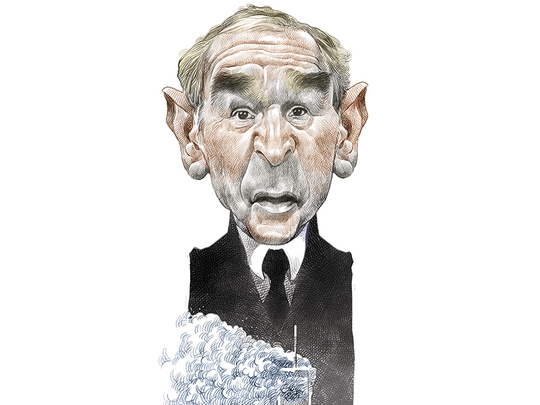
George W. Bush was the 43rd president of the United States, serving from 2001 to 2009. His time in office was dominated by the controversial “war on terror” that began with the terrorist attacks of September 11, 2001.
Bush was born on July 6, 1946, in New Haven, Connecticut, but was brought up in Texas when his father, the future President George H.W. Bush (in office 1989-1993), moved the family to try and make his fortune in the oil business. Bush was educated at Yale University. In 1968 he enrolled in the Texas Air National Guard as a pilot and, thus, was not eligible for the Vietnam War draft. He served two years in the Combat Crew Training School. After gaining his MBA in 1975, he returned to Texas to work in the oil industry. In 1978, he ran unsuccessfully for the House of Representatives. In 1988, Bush worked as a paid campaign advisor on his father’s successful presidential bid. Around this time he reached an important turning point in his life, pledging to quit his heavy drinking and becoming a born-again Christian.
By the late 1980s, Bush was independently wealthy as a result of selling his stake in the Texas Rangers baseball club. In 1994, he ran for the governorship of Texas and won. He was re-elected four years later. By 2000, he was the front-runner for the Republican presidential nomination, announcing social policies of “compassionate conservatism”, which included using churches and charities to use federal funds to deliver social services to the needy. After winning the nomination, Bush ran against the Democrat Al Gore. It was one of the closest races in presidential history, but after numerous court challenges and recounts Bush was declared the winner. He became only the second son to follow his father into the Oval Office.
For many Americans, doubts about Bush’s legitimacy as president were swept away on September 11, 2001, when extremists carried out the attacks on New York and Washington DC, causing the deaths of almost 3,000 people. Bush proclaimed that the US was at war with terrorism and this became the defining policy of his administration. As part of his “war on terror”, Bush ordered the invasions of Afghanistan in 2001 and Iraq in 2003.
Bush was re-elected to the White House in 2004, but criticism of his government’s response to the Hurricane Katrina natural disaster that devastated New Orleans in August 2005 marked the start of a terminal decline in Bush’s popularity. By 2008, disapproval of the Bush administration had increased sharply both at home and abroad, largely due to the ongoing war in Iraq. Scandals involving abuse of prisoners at Abu Ghraib prison in Baghdad and the treatment of terrorist suspects at facilities such as Camp X-Ray at Guantanamo, Cuba, had also done much to undermine the United States’ international standing.
The final months of the Bush presidency were further marred by the US economy entering recession, the “sub-prime” mortgage crisis and subsequent banking crisis. Bush’s departure from office was seen by many critics as an opportunity to restore the United States’ image around the world.
Bush’s legacy was always going to be controversial.
The manner in which he took office deeply split America and his response to 9/11 divided world opinion.
In the six years since he left the White House, Bush has often claimed that it is too early for historical judgments about his presidency. “It’s too soon to say how many of my decisions will turn out,” he wrote in “Decision Points”, his presidential memoir.
But in some of the most important areas of his presidency, it’s not too soon to draw conclusions. Just by judging against Bush’s own forecasts, some of the most far-reaching and important initiatives of his presidency didn’t work — or turned out poorly.
At the top of the list is the war in Iraq. Bush and his advisors badly misjudged what it would entail. They overestimated the international support the United States would be able to obtain for military action. They asserted before the war that American troops would need to stay in Iraq for no more than a couple of years. The administration’s public estimate before the war was that it would cost less than $100 billion (Dh367.3 billion); instead, it cost $2 trillion.
A similar fate will befall the second-most far-reaching aspect of Bush’s legacy, his historic tax cuts. Bush argued that they would stimulate the economy and spur economic growth. The short-term benefits proved dubious at best, but the harmful long-term consequences were incalculable, both for the federal government and, more importantly, for American society.
When Bush took office, America was in a brief period of budgetary surplus. There was actually a debate, forgotten and almost unimaginable today, about how to use the surplus: pay down the debt? Launch new federal initiatives? Bush chose to cut taxes, and then did so in ways (tax cuts on dividends and capital gains) that proved immensely beneficial to the wealthiest Americans.
Overall, Bush’s presidency is likely to be remembered for his lack of caution and restraint. Once, in the midst of a discussion with his military advisors, Bush made a telling observation: “Someone has got to be risk-averse in this process, and it better be you, because I’m not.”
George W. Bush was certainly not risk-averse. He took gambles both in foreign policy and with the economy. Sometimes they paid off. Yet overall, the country paid heavily for the risks he took. History isn’t likely to revise that judgment.
This column aims to profile personalities who made the news once but have now faded from the spotlight.












